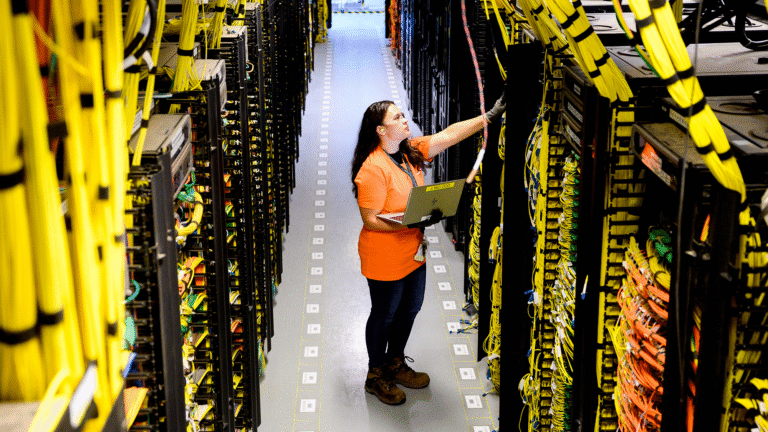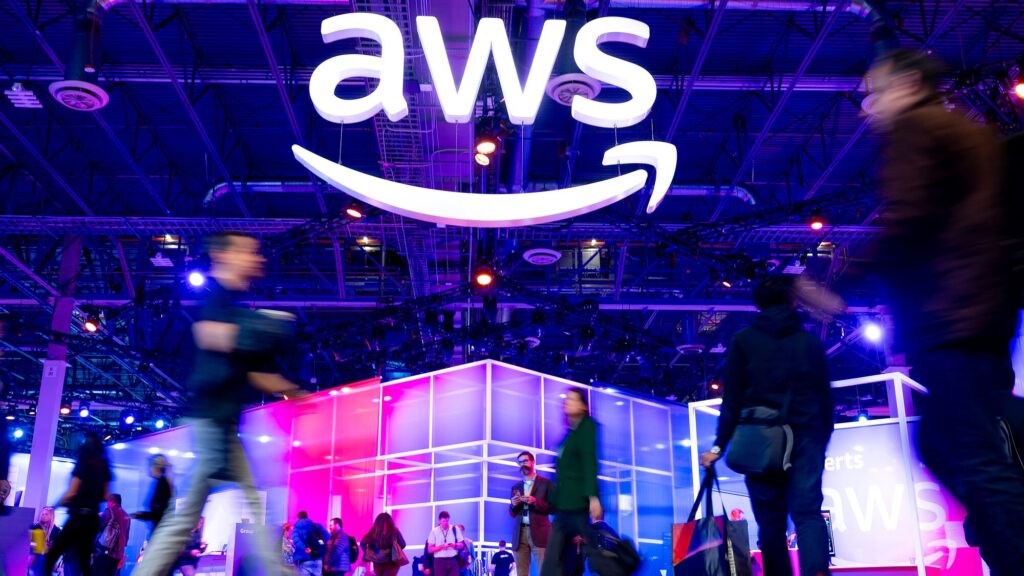Main Navigation Menu
© 2025 Tech Jacks Soutions, All Rights Reserved
© 2025 Tech Jacks Soutions, All Rights Reserved

AWS outage catastrophe disrupted global gaming infrastructure for over 15 hours as Amazon’s cloud services failure took down Fortnite, Battlefield 6, Roblox, and PlayStation services simultaneously. The Times of India reports Amazon Web Services outage brought the internet down across the world demonstrating catastrophic vulnerability of gaming’s centralized cloud dependency. The unprecedented failure confirms warnings about Big Tech’s infrastructure monopoly, where the collapse of a single provider destroys entire entertainment ecosystems, impacting millions of players worldwide.

Windows Central confirms massive AWS outage takes games offline with Fortnite, Roblox, PlayStation and Epic Games affected simultaneously, revealing gaming industry’s dangerous infrastructure concentration. The AWS outage disaster wasn’t limited to a single publisher or platform — it systematically wiped out multiplayer functionality across rival ecosystems that unknowingly shared the same points of failure.
TheGamer documents how from Fortnite to Palworld, the AWS outage ruined plenty of gamers’ mornings through complete service unavailability. The timing during peak gaming hours maximized impact, making weekend sessions impossible and disrupting planned tournaments, social gatherings, and streaming schedules.
Reddit’s technology discussion reveals huge AWS outage brings down Fortnite, Epic Games Store, and more gaming services with Roblox and Wordle also affected. The AWS outage disaster revealed hidden dependencies, where seemingly unrelated services failed at the same time because they shared the same infrastructure provider.
The 15-hour duration feels like eternity in digital services, where five-minute outages usually cause urgent responses. When critical infrastructure stays broken for more than half a day, the long-lasting failure indicates systemic issues beyond simple technical problems that need a complete overhaul.

TechRadar reports Battlefield 6, Fortnite, and other games finally recover as AWS outage comes to an end, but damage to EA’s momentum proved catastrophic. The AWS outage catastrophe struck during Battlefield 6’s critical second weekend destroying carefully orchestrated launch momentum that took years building.
Reddit’s Battlefield community documents server instability, disconnects, and latency issues throughout October 20, 2025, confirming AWS dependency for DICE’s supposedly robust infrastructure. The technical failure undermined Battlefield 6’s redemption story, where a smooth launch would have set it apart. from historically problematic franchise entries.
The timing couldn’t be worse—Battlefield 6’s 747,000 concurrent player record became meaningless when nobody could connect. The AWS outage catastrophe turned a triumph into a disaster, as positive word-of-mouth shifted to frustration with players blaming EA for Amazon’s infrastructure failure.
The launch weekend is an irreplaceable marketing opportunity where organic excitement drives adoption. When technical failures ruin first impressions, the reputational damage lasts regardless of the actual fault, showing how cloud reliance creates uncontrollable vulnerabilities.

PC Gamer analyzes financial impact estimates ranging from hundreds of millions to over $75 million per hour, though everyone agrees “it was pretty bad, chief.” The AWS outage catastrophe created cascading economic damage where lost gaming transactions, abandoned shopping carts, and cancelled subscriptions accumulated into staggering totals.
The $75 million hourly estimate likely underestimates gaming-specific losses, where microtransaction economies, battle pass purchases, and weekend peak spending patterns amplify baseline calculations. When Fortnite alone generates millions hourly through skin sales, the total impact across all affected games becomes even more significant.
The financial damage goes beyond immediate transaction losses to include costs for compensation, reputation repair, and player retention efforts. The AWS outage disaster forces publishers to offer apology rewards, extended subscriptions, and premium currency compensation in an attempt to rebuild goodwill.
The market impact shows how cloud concentration creates systemic economic risk, where failures of a single provider can trigger industry-wide downturns. When infrastructure monopolies control essential services, their failures become economic weapons of mass destruction, affecting entire sectors at once.

Esports News UK examines how AWS internet outage impacted esports with multiple tournaments cancelled or postponed. The AWS outage catastrophe destroyed competitive integrity where ongoing matches terminated mid-game while scheduled events became impossible without functional infrastructure.
The tournament cancellations created a cascade of problems, making travel arrangements, venue bookings, and broadcast schedules useless. When infrastructure fails during live events, the financial losses grow due to non-refundable expenses and breach of contract, affecting entire competitive ecosystems.
Professional players lose crucial practice time during tournament prep periods, where every hour counts for maintaining their competitive edge. The AWS outage disaster disrupted training schedules, scrim setups, and team coordination, which cannot be recovered by extending sessions.
The impact on streaming multiplied the damage, as tournament broadcasts generate primary revenue through sponsorship activations and viewer engagement. When competitions cannot happen, the advertising value disappears along with viewer trust in platform reliability, which hurt future event valuations.

Financial Times argues cloud computing is too important to be left to the Big Three, articulating systemic risk from infrastructure concentration. The AWS outage disaster confirms worries about Amazon, Microsoft, and Google controlling vital infrastructure, where reduced competition leads to single points of catastrophic failure.
The monopolistic structure developed through network effects, where early cloud adopters selected established providers, creating self-reinforcing dominance. When everyone uses AWS because everyone else uses AWS, this circular logic fosters dangerous dependencies that are resistant to market forces.
The concentration of AWS in the gaming industry mirrors broader economic trends where convenience and cost savings are prioritized over resilience. The AWS outage catastrophe highlights the false economy of saving infrastructure costs, as outage losses and damage to reputation far outweigh those savings.
Regulatory implications point to the need for intervention, including infrastructure diversity or interoperability standards, to prevent dependencies on a single provider. When market failures generate systemic risks, government intervention becomes essential to safeguard economic stability from corporate concentration.

AWS’s official statement claims services operating normally, providing minimal acknowledgment of catastrophic failure affecting millions globally. The AWS outage response highlights Big Tech’s tendency to avoid accountability, where vague statements replace clear explanations or commitments to compensation.
The declaration of “operating normally” while games remained offline showed corporate gaslighting, where Amazon’s definition of “normal” apparently includes 15-hour global outages. When companies downplay catastrophic failures through semantic manipulation, their communication strategy insults affected users’ intelligence.
The lack of a technical explanation prevents understanding whether architectural flaws, human error, or external attacks caused the failure. The opacity of the AWS outage enables Amazon to avoid responsibility, while customers cannot assess whether similar failures might happen again.
The silence on compensation indicates Amazon’s market power that allows customer abuse without repercussions. When infrastructure monopolies know customers lack alternatives, accountability incentives vanish, creating environments where service quality declines without market punishment.

The AWS outage highlights the need for the gaming industry to evaluate alternative infrastructure strategies that reduce reliance on a single provider. Multi-cloud architectures, which distribute services across AWS, Azure, and Google Cloud, could prevent total failures but may also increase complexity and costs.
Edge computing solutions that bring processing closer to players can decrease dependence on centralized clouds while improving latency. For games requiring millisecond responses, local infrastructure offers better performance and resilience compared to distant data centers.
Hybrid architectures that maintain private infrastructure for critical services while utilizing public cloud resources for scaling can strike a balance between cost and control. The AWS outage underscores the vulnerabilities of pure cloud strategies, where complete outsourcing can lead to unacceptable dependencies.
Blockchain and decentralized infrastructure are still developing but could eventually support truly distributed gaming platforms that are resistant to single-provider failures. When each node contributes processing power, network resilience significantly improves, though current technology does not yet match the performance of centralized systems.

The AWS outage disaster halted global gaming for 15 hours, exposing the fragile nature of centralized cloud infrastructure where a failure by a single provider can devastate entire entertainment ecosystems. The simultaneous shutdown of Fortnite, Battlefield 6, Roblox, and PlayStation services uncovered hidden dependencies that create systemic vulnerabilities.
The 15-hour outage set a new record for failure length, as typical five-minute disruptions often prompt quick crisis responses. This prolonged blackout indicates deeper architectural issues beyond mere technical glitches, demanding a reevaluation of infrastructure to address concentration risks.
The destruction of Battlefield 6’s launch weekend exemplifies collateral damage, where AWS failure hampered EA’s recovery efforts and wiped out irreplaceable momentum. This timing disaster turned a successful launch into a catastrophe, illustrating how cloud reliance can lead to vulnerabilities outside the publisher’s control.
Financial losses estimated at $75 million per hour likely underestimate the impact on gaming-specific economies, where microtransactions and weekend peak periods amplify the damage. The economic fallout extends beyond immediate losses, including costs for compensation and reputation repair, which multiply the initial impact.
Cascading failures resulted in esports tournament cancellations, damaging competitive integrity, broadcast revenues, and sponsorships. Professional players lost valuable practice time, while organizers faced non-refundable expenses and breaches of contracts.
The risks associated with a cloud monopoly reinforce warnings from the Financial Times about the concentration of the Big Three—Amazon, Microsoft, and Google—in infrastructure, creating systemic vulnerabilities. This market structure discourages competitive pressure, stymies service improvements, and enables avoidance of accountability.
Amazon’s claim of “operating normally” exemplifies Big Tech’s gaslighting, as disastrous failures often receive minimal acknowledgment without meaningful explanations or compensation. Their opacity impedes understanding of the causes of failure, and their market dominance allows customer mistreatment without repercussions.
Alternatives like multi-cloud architectures, edge computing, and hybrid solutions could lessen dependence on a single provider, although they tend to increase complexity. The AWS outage underscores the need for the industry to reconsider reliance on pure cloud solutions, given the unacceptable risks of concentration.
Smart gaming companies should treat the AWS outage as a wake-up call, emphasizing the importance of diversifying infrastructure despite the added costs and complexities. The supposed convenience of centralization creates a false economy, where savings are overshadowed by outage-related losses and reputational damage.
Gaming deserves resilient infrastructure where entertainment availability isn’t reliant on a single company’s competence. This outage highlights the urgent need for regulatory measures to prevent infrastructure monopolies from holding digital entertainment hostage.
The failure supports the cypherpunk philosophy advocating for decentralized systems that resist single points of failure. When centralized services become society’s nervous system, their collapse can paralyze entire civilizations, exposing architectural fragility that requires fundamental reconsideration.
